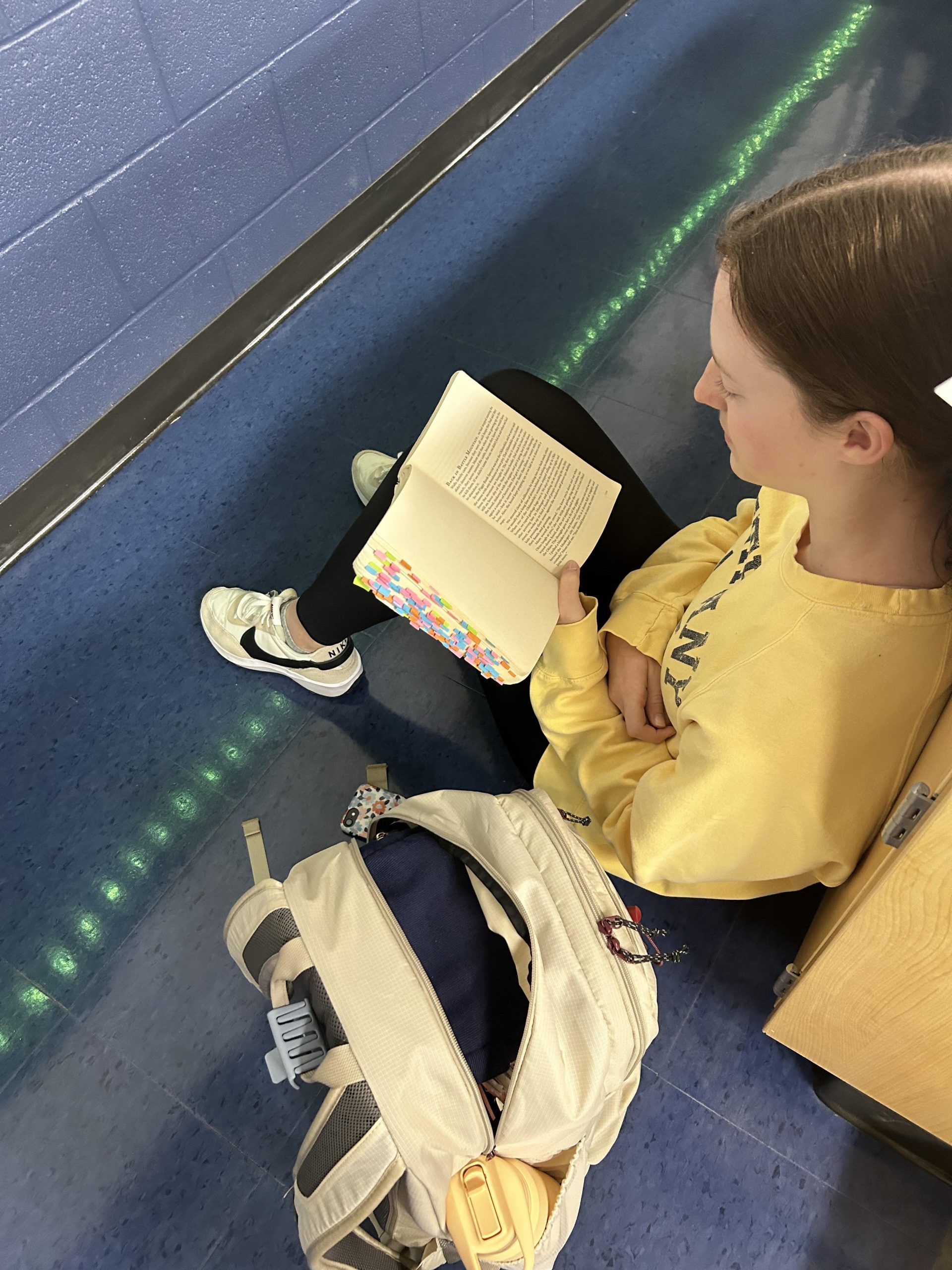The third marking period is coming to a close, and students will soon be anticipating their next report card.
Whether it’s all 90% and above, honor roll, or a good comment from a teacher, there is always something that a student is dying to see.
Many wonder how some students get perfect straight A’s, school year after school year.
According to senior Ellie Maeulen, it all comes down to time management and self-motivation.
“I’ve always just been pretty self-driven and motivated,” Maeulen said.

“Always go to teachers for help and ask questions when you have them,” Maeulen said when asked about what students can do to achieve straight-A’s.
Everyone should take a few notes from Maeulen’s book. Finishing the first marking period with a 107% average, she knows what she is doing.
“It’s important to have good time management and stay on top of deadlines. This has made it so I’ve never had any difficulty balancing school and life,” said Maeulen.
“I know it’s not fun at all, but you have to study,” said junior Savanna Farley “Find something you like about a subject and try to enjoy it as much as you can. Distraction is inevitable, so take breaks.”
Farley even gave some examples of things that she uses to give her brain a break.
“Don’t be on your phone, go take a walk to the kitchen and eat a snack, talk to your mom, or sit and stretch for a while,” Farley said. “Even if your brain wants you to procrastinate, keep going. Work for a few minutes until your mind is totally focused on what you’re doing. It really helps!”
Farley also said that her biggest motivation is herself.
“I push myself so hard to do well because of expectations that I have for myself and others have for me as well. My parents have also pushed me a little bit, but I take it further and go above and beyond for everything I’m involved in,” Farley said. “I end up benefiting from it in the long run, so I figure if I keep going the way I’m going, success will come sooner rather than later.”
Addison Confer, a senior, also pushes himself to his fullest potential in all of his classes.
He said he has a specific setup that works best for him when he needs to focus on schoolwork.
“I prefer places where the sun can shine in and warm up the room. I also like to study with my AirPods in, playing ambient background noise,” said Confer.
When he is not at a club meeting, dance class, at the school for music or theatre, or doing volunteer work, Confer said he is most likely devoting his time to his studying and homework.
“Since my coursework as a senior is lighter compared to my other years, I’d say on average I spend around three hours each night on homework,” Confer said. “However in the past, there were nights where I would be doing homework for around ten hours.”
Commitment is huge for Confer. With all of his AP classes and various clubs that he holds leadership positions in, he must put the work in, and he advises that other students do the same if they want the best grade possible.
“Never be afraid to ask for help. It’s a teacher’s job to help their students, and I feel any teacher at Montoursville would be more than happy to help their students,” said Confer.
Something that Confer noticed throughout his high school experience is that he spent all of his time doing school, so he is trying to make a change to that now that his time as a high school student is very quickly wrapping up.
“I don’t really ever spend time with my friends or family because I have too much to get done,” Confer said. “One of my goals for senior year is to allocate more time for friends and family so I get to experience life as a teen before it’s too late.”
As it is to Maeulen and Farley, motivation is also a very important key to Confer’s success.
“I’m motivated to work so hard because I realize that if I do the hard work now, everything will pay off in the end,” Confer said. “My hard work in school and college will show when I have a job that makes six figures. I’m just doing the hard work now so I don’t have to later.”
Unlike Confer’s warm, inviting, dream-like study sessions, sophomore Rowan Fortin takes a way different approach when it comes to studying.
“I study at my kitchen counter because it is uncomfortable and I don’t want to fall asleep,” Fortin said.
Fortin manages to juggle her busy schedule full of sports practices and clubs. But that also means that she has to come home with a lot of schoolwork to do. So, she has learned to spend her time wisely and be productive when she needs to be.
“I have learned to manage my time and complete homework during study halls as well as right after school. It is a lot of work, but I find a way to manage it,” Fortin said. “I manage my time and work over the weekend to lighten my workload over the week. I make sure to never go to bed without preparing for tests, quizzes, and homework.”
Student-athletes are a whole other story. On top of school and life outside with family and friends, they also play a sport that requires intense practice and missing school for games/meets.
Junior Gabe Vanderwall, does football, wrestling and lifting.
“I am motivated because I would like to attend the naval or army academies for college and I realize that it takes the best qualifications to get accepted,” Vanderwall said. “I just try to set aside some time for school work and then plan out the rest of my day around that.”
Junior, Evelyn Weng, although not a student-athlete, still gave a similar response and said, “I try my best to plan ahead and not procrastinate.”
There are more students than just Fortin and Confer who are involved in a pile of clubs, committees, and sports.
That’s why it is so common for kids to be overwhelmed trying to balance school, after-school activities, and time for friends and family, all on top of just living a normal teenage life.
Weng is known around the school for her outstanding grades, a packed schedule, and her involvement in so many extracurricular activities.

“I probably spend around three hours a night on homework and studying,” she said. “I dance once a week, and I help my parents at [their restaurant] Family Wok.”
Maeulen’s list of commitments just speaks for itself.
“It depends on the day, but on average I’d say I spend about an hour to two hours on homework every day. I am on the State Board for Key Club, and workout and practice for javelin which takes a lot of my time on top of school work,” Maeulen said. “I also have a job at a restaurant, which is one to two shifts a week, as a tutor every day, and at Geisinger on Wednesdays.”
Motivation is a common factor in all of these students’ studying habits. So what happens when they get a grade that they are not happy with?
Vanderwall said, “My reaction is to want to work harder so I will not get disappointed with myself the next time,” which is a similar response to what Maeulen had to say.
“It motivates me to find ways I can improve,” Maeulen said.
Both Farley and Weng try not to let it bother them too much when they get what they consider a bad grade.
“I do get upset but I try to move on quickly and not let it discourage me too much,” said Weng.
“I see the paper, I put it in my folder, and I say ‘Oops! Time to go home and study,’” said Farley. “I kind of just ignore it, and then focus on whatever we’re doing next. I can’t fix the mistake I already made because school doesn’t give second chances.”
Any teenager can say that they have a messed up sleep schedule. Either they are going to bed too early and waking up early, going to bed late and waking up late, or even being five hours short of the amount of sleep they are supposed to be getting.
A lot more students than one might think, are truly not getting enough sleep.
The recommended amount of sleep for a young adult ages 13 to 18, according to the Centers for Disease Control and Prevention, is eight to ten hours.
https://archive.cdc.gov/#/details?url=https://www.cdc.gov/healthyschools/features/students-sleep.htm
But there are students like Weng, who are getting seven hours on school nights and about nine hours on weekends.
“I shoot for eight hours a night,” said Maeulen.
It is not that these students do not want to be sleeping longer, it is just that they have so much on their plate that that is all they can spare.
There are also students with a wide range within their sleep schedule, like Farley and Fortin, but they still might not be technically getting enough sleep on average.
“On school nights I get around seven to eight hours. On weekends it could honestly be anywhere from eight to twelve hours,” Farley said.
“Normally on school nights I get about six hours and on weekends I catch up with about ten hours,” said Fortin.
That is another thing, many kids have to play the catchup game when it comes to the number of hours of sleep they get. When it’s finally the weekend, they can make up for those lost hours of sleep during the week.
Along with Farley and Fortin, Confer also experiences this. “On school nights, I get on average six hours of sleep. But I have had some days where I get eight hours and then there are somewhere I get two,” Confer said. “My weekends are much more forgiving since I get a good nine to ten hours of sleep.”
So all in all, being a straight-A student is great and will come with many perks in the future for that student. There are, however, sacrifices and consequences, like sleep and time with friends and family, that come with that title.
Featured image (at top): Junior Savanna Farley uses her spare time wisely during her Flex period to read for her English class assignment. Her seventh-period AP Language and Composition class has been assigned to read “The Glass Castle.” Photo taken by Lindsay Garber.







Socials